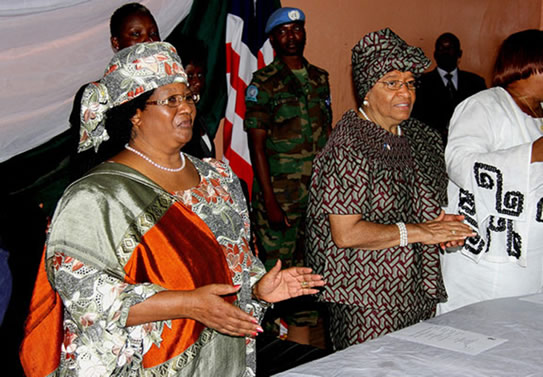
The 61-year-old cuts a maternal figure that presents a stark contrast to her professorial predecessor, who styled himself the “Economist in Chief.”
A winner of national and international awards for her work as a supporter of women’s rights, Banda was last year named by Forbes Magazine as Africa’s third most powerful female politician after Liberian President Ellen Johnson Sirleaf and Nigerian Minister of Finance Ngozi Okonjo-Iweala.
She will hope her influence stands her in good stead as she looks to rebuild ties with Malawi’s main foreign donors – including former colonial power Britain and the United States – who had squabbled with and been alienated by Mutharika.
Until now the policeman’s daughter has spent a lot of her time and energy campaigning on behalf poor rural African women, trying to persuade them they should not simply accept the existence they have inherited.
Her ambition is to set women on the world’s least developed continent free from the cycle of poverty and abuse that has haunted them for centuries.
She said her friend, much brighter than herself, was forced to leave high school after just one term because her family couldn’t afford the $12 needed for the school fees.
“I went on to go to college and I became the vice president of Malawi. She is still where she was 30 years ago,”
“The vicious cycle of poverty kept her there and took away her options. I made up my mind at that point, whatever would happen in my life, I would try to send girls to schools.”
This personal pledge was behind Banda’s decision to complete a Bachelor of Arts Degree in Early Childhood Education from Columbus University in the United States.
Setting up a garment manufacturing business and later a bakery,she used the proceeds to send underprivileged girls to school.
She also founded three major organisations in Malawi: the National Association of Business Women, the Young Women’s Leaders Network, and the Joyce Banda Foundation.
The campaigning for women’s rights did not stop when she joined the government in 2004. As Minister of Gender, Child Welfare and Community Services she fought to get a domestic violence bill enacted.
She became Minister of Foreign Affairs in 2006 and the country’s first female vice president in 2009.
A year later Banda was kicked out of the ruling Democratic Progressive Party (DPP) as Mutharika pushed to groom his brother Peter, Malawi’s foreign minister, as his replacement.
Creating her own People’s Party, Banda maintained her state position as vice president. With the emergence of President Joyce Banda, taking over the reins of power, after the abrupt death of her predecessor, History has given her an opportunity to write her name in Gold by presiding over good governance in Malawi and be a source of positive inspiration to women all over the continent. Banda is expected to run the country until scheduled elections take place in 2014


